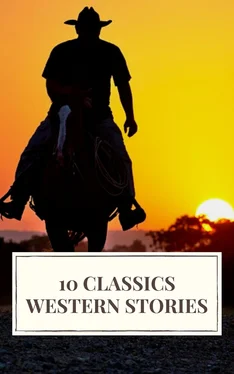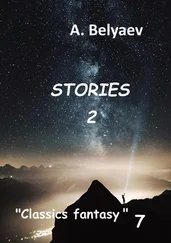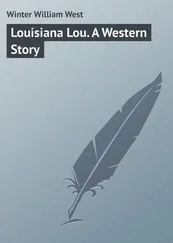Thurston, on the contrary, glowered at the world for two hours after. Park was a fine fellow, and Thurston liked him about as well as any man he knew in the West, but—And thus it went. On each and every visit to the Stevens ranch— and they were many— Hank, learning by direct inquiry that the story still suffered for lack of a hero, suggested some fellow whom he had at one time and another caught "shining" around Mona. And with each suggestion Thurston would draw down his eyebrows till he came near getting a permanent frown.
A love story without a hero, while it would no doubt be original and all that, would hardly appeal to an editor. Phil tried heroes wholly imaginary, but he had a trick of making his characters seem very real to himself and sometimes to other people as well. So that, after a few passages of more or less ardent love-making, he would in a sense grow jealous and spoil the story by annihilating the hero thereof.
Heaven only knows how long the thing would have gone on if he hadn't, one temptingly beautiful evening, reverted to the day of the hold-up and apologized for not obeying her command. He explained as well as he could just why he sat petrified with his hands in the air.
And then having brought the thing freshly to her mind, he somehow lost control of his wits and told her he loved her. He told her a good deal in the next two minutes that he might better have kept to himself just then. But a man generally makes a glorious fool of himself once or twice in his life and it seems the more sensible the man the more thorough a job he makes of it.
Mona moved a little farther away from him, and when she answered she did not choose her words. "Of all things," she said, evenly, "I admire a brave man and despise a coward. You were chicken-hearted that day, and you know it; you've just admitted it. Why, in another minute I'd have had that gun myself, and I'd have shown you—but Park got it before I really had a chance. I hated to seem spectacular, but it served you right. If you'd had any nerve I wouldn't have had to sit there and tell you what to do. If ever I marry anybody, Mr. Thurston, it will be a man."
"Which means, I suppose, that I'm not one?" he asked angrily.
"I don't know yet." Mona smiled her unpleasant smile—the one that did not belong in the story he was going to write. "You're new to the country, you see. Maybe you've got nerve; you haven't shown much, so far as I know—except when you talked to the boys that night. But you must have known that they wouldn't hurt you anyway. A man must have a little courage as much as I have; which isn't asking much—or I'd never marry him in the world."
"Not even if you—liked him?" his smile was wistful.
"Not even if I loved him!" Mona declared, and fled into the house.
Thurston gathered himself together and went down to the stable and borrowed a horse of Jack, who had just got back from town, and rode home to the Lazy Eight
When Hank heard that he was home to stay—at least until he could join the roundup again—he didn't say a word for full five minutes. Then, "Got your story done?" he drawled, and his eyes twinkled.
Thurston was going up the stairs to his old room, and Hank could not swear positively to the reply he got. But he thought it sounded like, "Oh, damn the story!"
Chapter 9 The Drift of the Herds
Weeks slipped by, and to Thurston they seemed but days. His world-weariness and cynicism disappeared the first time he met Mona after he had left there so unceremoniously; for Mona, not being aware of his cynicism, received him on the old, friendly footing, and seemed to have quite forgotten that she had ever called him a coward, or refused to marry him. So Thurston forgot it also—so long as he was with her.
How he filled in the hours he could scarcely have told; certain it is that he accomplished nothing at all so far as Western stories were concerned. Reeve-Howard wrote in slightly shocked phrases to ask what was keeping him so long; and assured him that he was missing much by staying away. Thurston mentally agreed with him long enough to begin packing his trunk; it was idiotic to keep staying on when he was clearly receiving no benefit thereby. When, however, he picked up a book which he had told Mona he would take over to her the next time he went, he stopped and considered:
There was the Wagner trial coming off in a month or so; he couldn't get out of attending it, for he had been subpoenaed as a witness for the prosecution. And there was the beef roundup going to start before long—he really ought to stay and take that in; there would be some fine chances for pictures. And really he didn't care so much for the Barry Wilson bunch and the long list of festivities which trailed ever in its wake; at any rate, they weren't worth rushing two-thirds across the continent for.
He sat down and wrote at length to Reeve-Howard, explaining very carefully—and not altogether convincingly—just why he could not possibly go home at present. After that he saddled and rode over to the Stevens place with the book, leaving his trunk yawning emptily in the middle of his badly jumbled belongings.
After that he spent three weeks on the beef roundup. At first he was full of enthusiasm, and worked quite as if he had need of the wages, but after two or three big drives the novelty wore off quite suddenly, and nothing then remained but a lot of hard work. For instance, standing guard on long, rainy nights when the cattle walked and walked might at first seem picturesque and all that, but must at length, cease to be amusing.
Likewise the long hours which he spent on day-herd, when the wind was raw and penetrating and like to blow him out of the saddle; also standing at the stockyard chutes and forcing an unwilling stream of rollicky, wild-eyed steers up into the cars that would carry them to Chicago.
After three weeks of it he awoke one particularly nasty morning and thanked the Lord he was not obliged to earn his bread at all, to say nothing of earning it in so distressful a fashion. There was a lull in the shipping because cars were not then available. He promptly took advantage of it and rode by the very shortest trail to the ranch—and Mona. But Mona was visiting friends in Chinook, and there was no telling when she would return. Thurston, in the next few days, owned to himself that there was no good reason for his tarrying longer in the big, un-peopled West, and that the proper thing for him to do was
go back home to New York.
He had come to stay a month, and he had stayed five. He could ride and rope like an old-timer, and he was well qualified to put up a stiff gun-fight had the necessity ever arisen—which it had not.
He had three hundred and seventy-one pictures of different phases of range life, not counting as many that were over-exposed or under-exposed or out of focus. He had six unfinished stories, in each of which the heroine had big, blue-gray eyes and crimply hair, and the title and bare skeleton of a seventh, in which the same sort of eyes and hair would probably develop later. He had proposed to Mona three times, and had been three times rebuffed— though not, it must be owned, with that tone of finality which precludes hope.
He was tanned a fine brown, which became him well. His eyes had lost the dreamy, introspective look of the student and author, and had grown keen with the habit of studying objects at long range. He walked with that peculiar, stiff-legged gait which betrays long hours spent in the saddle, and he wore a silk handkerchief around his neck habitually and had forgotten the feel of a dress-suit.
He answered to the name "Bud" more readily than to his own, and he made practical use of the slang and colloquialisms of the plains without any mental quotation marks.
By all these signs and tokens he had learned his West, and should have taken himself back to civilization when came the frost. He had come to get into touch with his chosen field of fiction, that he might write as one knowing whereof he spoke. So far as he had gone, he was in touch with it; he was steeped to the eyes in local color—and there was the rub The lure of it was strong upon him, and he might not loosen its hold. He was the son of his father; he had found himself, and knew that, like him, he loved best to travel the dim trails.
Читать дальше












